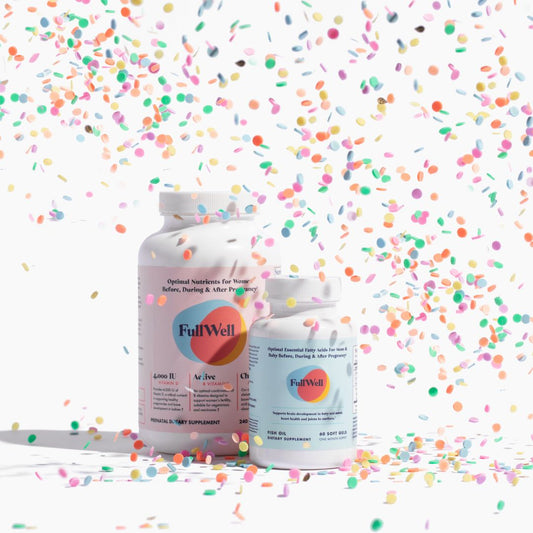Preconception & Postnatal Chiropractic with Dr. Eva Zingone
Read more

In honor of Breastfeeding Awareness Month, we rounded up FullWell's most trusted lactation experts for the facts on breastfeeding, their professional opinions on different variations of feeding, and the best advice on how you can make the choices that work best for you and your baby.
Let's dive in and meet our experts!
Allegra Gast, RD, is a functional dietitian & lactation consultant specializing in helping women nourish themselves as they nourish their newborns. As an International Board Certified Lactation Consultant, postpartum doula, military spouse, and mother herself, she is passionate about helping moms regain their energy and feel like themselves in that "fourth trimester."
"What I wish more moms knew about breastfeeding is that, although it's natural, it's not always easy. I see many families prepare their nursery and take labor and delivery courses and prepare for birth, which is great, but they don't prepare for life after birth. I wish more attention were paid to prepping for the postpartum period (creating freezer meals, creating a nursing station, taking breastfeeding courses, etc.). I also wish more moms knew that support is available for breastfeeding families! International Board Certified Lactation Consultants (IBCLC) were created because breastfeeding isn't always easy. Getting that support can make a world of difference, and you don't have to do it alone."
There are many valid reasons to want to breastfeed, even when it doesn't feel intuitive for mom and baby. Studies show that maternal benefits of breastfeeding are ample, including decreased risks of breast cancer, ovarian cancer, postpartum depression, hypertension, cardiovascular disease, and type 2 diabetes (1). Additionally, consistently breastfed infants seem to experience decreased risks of atopic dermatitis and gastroenteritis (1). Unfortunately, this, paired with a cultural attitude of breastfeeding being the end-all-be-all, means that - in the spirit of wanting to do what they perceive to be best for their baby - some women try to grin and bear it when breastfeeding isn't going smoothly.
"After the birth of my first child, I struggled so intensely while trying to breastfeed. I truly cannot convey what a nightmare it was: my nipples were constantly raw and cracking open, and in addition to leaking, I was bleeding all the time from the tough feedings. Finally, after three months of almost no sleep and living in constant pain, I went to a lactation consultant, who was speechless when she looked at my breasts. I was worried by her reaction, but she was just empathetic. I felt relief when she finally said, "We are going to fix this immediately, don't worry." She set me up with better strategies for feeding time, helped me heal, and worked with me to find a pump that worked much better for me. She also was a huge emotional support, coaching me through the process and reassuring me that absolutely nothing was wrong with me. I had not wrapped my mind around formula and wasn't mentally able to make that switch, so finally getting help was a game changer."
That said, it can be helpful to plan for feeding in multiple ways. Just as you may have made a birth plan (and then perhaps a birth plan B and even C), envision yourself feeding baby in different ways. Multiple plans can help free you of any hesitancy around making choices that go against preconceived notions.
Erin Moore, NP, is a pediatric nurse to babies and kids, and throughout her career, she has become a lactation counselor who understands the struggles and stigmas surrounding breastfeeding.
Raise your hand if you've ever heard someone knowingly chide, "Breast is best!".
Yeah, that's not her style.
While we can all acknowledge that breastfeeding can be an excellent choice and comes with myriad benefits, conveying to parents that it is the only optimal option makes it SO much harder if the process doesn't go as planned.
The truth is, it is unethical and practically impossible to carry out any major, randomized trials on infants; therefore, the standard recommendation that six months of exclusive breastfeeding is ideal comes from purely observational studies (2).
Even as a seasoned nurse, Erin was shocked by the lack of credible, research-based resources she could get her hands on when it came to helping out patients and clients with alternate options. The quality of resources on choosing formula or how to combination feed was lackluster and unhelpful at best, so she was inspired to start her operation as a lactation counselor to guide new parents throughout their feeding journeys without shame or guilt.
"There is so much pressure on mothers to breastfeed. Sometimes it comes at the detriment of mom's mental health. In my opinion, a fed baby and a happy and present mom are equally important. Infant feeding is a journey. There are a lot of ups and downs, and sometimes it's more stressful than fun. Having support and guidance along the way can make your journey a little easier.
It is up to the parent to decide what is best for their family. Period."
As for ways to keep judgmental comments at bay, Erin has a lot of great ideas.
When it comes to options, there is no right or wrong, and breastfeeding and formula feeding aren't necessarily mutually exclusive. Combination feeding can be an excellent option for some!
"Combining breastmilk and formula is a great way to feed your baby. Formula is also a great option for many moms. Each family will have needs that differ from the next family, and what is 'best' should be considered case-by-case basis."
"My kid wasn't latching, my supply sucked, it just wasn't happening for us. I already suffer from pretty severe anxiety, and the stress of it all was debilitating. Here I was, a brand new mom with a baby who was only a few days old, and I was terrified she wasn't getting enough nutrition. When my OB suggested formula, I thought she was joking, but she encouraged me to consider combination feeding or just going for formula only. I had so much guilt about not being able to have that bonding experience with my baby, so I opted for a combination of pumping and formula. Pumping was the worst, and I finally just dropped it. I was so much happier when I just let go and made the choice that worked best for us. I became one thousand times more tolerable, and I also got more sleep because my husband was able to help with nighttime feedings. My oldest is a healthy and normal four-year-old now. Did I have to shut down some mom shamers? Of course. Was it hard? Kind of, but it eventually felt very satisfying to stand up for myself!"
If you've chosen to combination feed or feed exclusively with formula and have ever felt any external pressure about it, you're not alone. Qualitative studies have reported that many women believe that the social environment surrounding infant feeding leads to feelings of stigma once they turn to formula feeding (3). Therefore, ensuring mothers get more (and better!) information to inform their choices and support for their practices should be a top priority for health care providers.
Aubrey Phelps, MS, RDN, IFNCP, PPCES, CLC is a registered dietitian, perinatal fitness coach, lactation counselor, and kangaroula.
(Sidenote: Not sure what a "kangaroula" is? No problem. While a doula focuses on mama's needs during labor and birth, a kangaroula primarily concentrates on baby.)
With a wealth of knowledge and experience in perinatal + pediatric nutrition and integrative + functional medicine, she helps women improve their health, cycles, and fertility for healthy pregnancies to reduce their risk of complications and preterm delivery.
"I'm a mother to four beautiful earth-side babes and four angels I have yet to meet. My matrescence has been different for each child and full of shifts and challenges I could have never imagined. I became a "member" of groups I never intended to join: The Miscarriage Club, The NICU Team, The Premie Club, The Pre-eclampsia Group, The Feeding-Tube Club, The C-section Group, The VBAC Team, The PPA, PPD, and PTSD Club, The Secondary Infertility Group, The Exclusive Pumping Club, and more.
Becoming a mother has been one of the most beautiful, trying, exhausting, exhilarating, humbling, terrifying, and rewarding things I've ever experienced. It is my absolute honor and pleasure to support other women in this journey."
As an RD, Lactation Consultant, and mom herself, she feels the pressure on new moms to breastfeed exclusively is… intense.
"I personally choose to exclusively breastfeed, but it's HARD, and I'm also blessed with
(I also have kids who prefer to drink directly from the tap, so I don't have a ton of options!)
Unfortunately, in our desire to increase breastfeeding rates, I think we've actually started to put so much pressure on new moms that they feel ashamed and guilty if they can't or don't want to exclusively breastfeed. And I firmly believe that, while breast milk might be the best nutrition option for babies, it doesn't mean breastfeeding is always the best option for every family. It's so important that breastfeeding works for both mom and baby."
The one thing Aubrey wishes more people knew about breastfeeding?
"It might be natural, but it often doesn't come naturally. I'm a mom of 4 and lactation counselor, and I still sought lactation support with every baby! Yes, I've nursed successfully before, but that was a different baby and a different nursing relationship. Each child has needed something a bit different, and it definitely isn't just like 'riding a bike'.
It's okay to ask for help, and more importantly, it's ok if breastfeeding doesn't come naturally or feel easy. You're not doing it 'wrong': it's just hard!"
Aubrey has some tried and true tips for those trying to keep their supply going strong throughout the process.
"And not just with water: think electrolytes too! I'm a huge fan of LMNT electrolytes. Keep a big water bottle filled and easy to sip throughout the day. FullWell's Nourished Nerves can be an ideal nighttime addition to help promote quality sleep and alleviate stress."

"One-handed, easy-to-grab options that are nice and nutrient dense are great! I love high-quality beef jerky, cheese, hard-boiled eggs, smoothies, and oat balls (made with oats, peanut butter, collagen, and mix-ins)."
"Make sure you're getting at least three meals a day. It's easy to forget or get too busy between nursing, diaper changes, and spit-ups, but it's so important for postpartum recovery and supporting milk supply."
"There are no magic foods for lactation. Save yourself the stress about spending money on fancy supplements, "super lactation foods", or fancy sports drinks. All you have to do is focus on nourishing your body with good protein, healthy fats, and quality carbs."
"Supply is based on demand. Optimize milk supply after delivery by removing milk. This will signal your body to keep making more. Get regular skin to skin contact, let baby nurse on demand, or at least every 3 hours (some newborns are super sleepy and even need to be woken to nurse!). If baby can't nurse for whatever reason, try to pump or hand express on the same schedule."
"If you are nursing on demand, adding in pumping before 4-6 weeks could lead to an oversupply, which can increase the risk for clogged ducts and overwhelming baby with too much milk too fast."
All of that said, Aubrey clarifies that breastfeeding isn't always the best option for all families.
"In many cases, that's due to poor support, and the real issue is that these moms need more support and a better postpartum system. Unfortunately, we can't always change that, which means for some families, breast milk might be best, but breastfeeding isn't. Mom's well-being matters. If mom is completely exhausted, dreads nursing due to clogged ducts and mastitis or bleeding nipples, or if baby isn't growing well and mom is so stressed that she is nursing, pumping, and bottle feeding with no time to rest or even feed herself... none of that is 'best' for anyone. A mom who is depleted, desperate, and poorly nourished can't possibly be 'best' for baby, even if baby is still getting breast milk. So, despite being a nursing mother myself, lactation counselor, and pediatric dietitian, I don't advocate for breastfeeding at all costs. As I often say:
